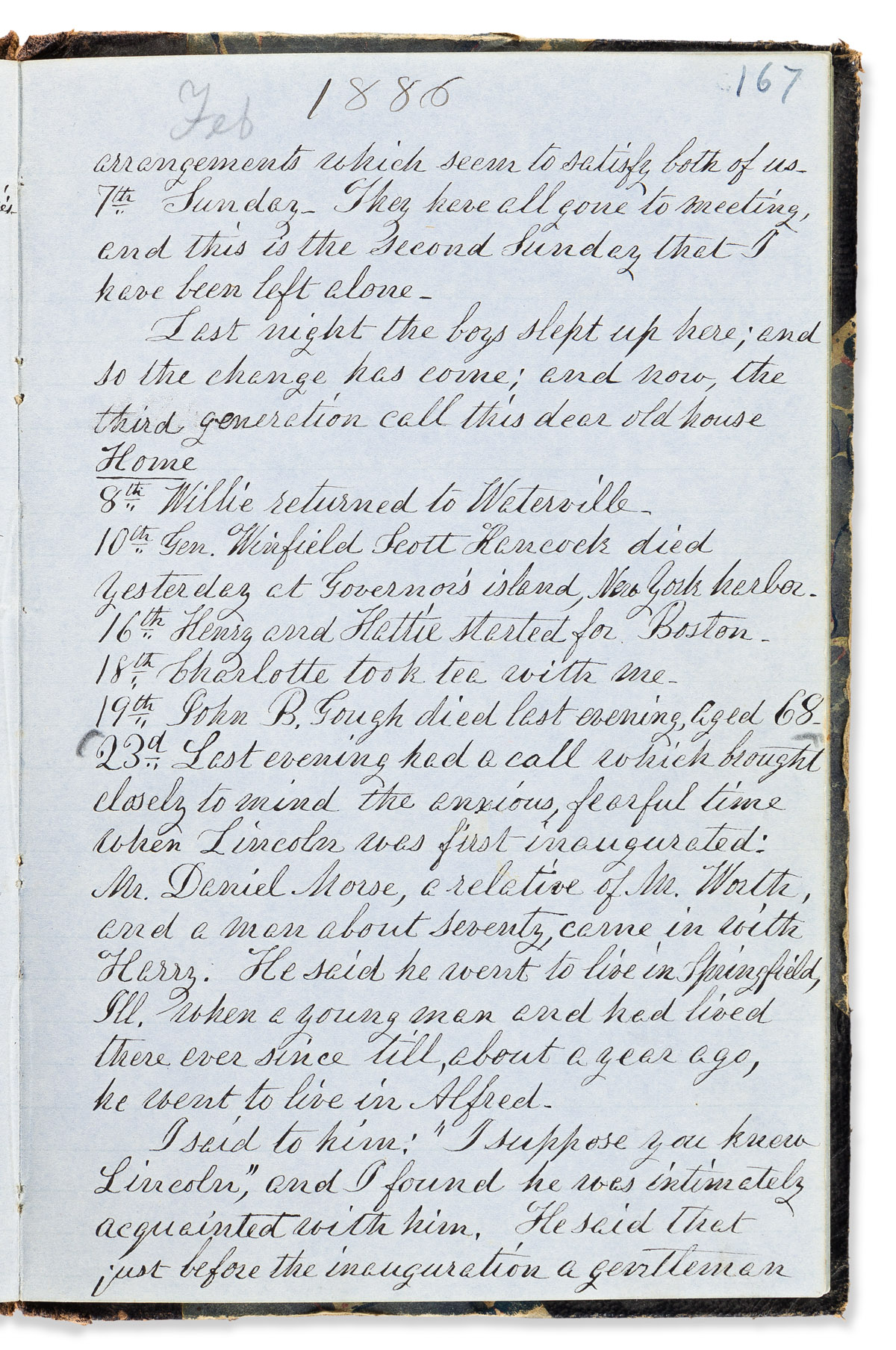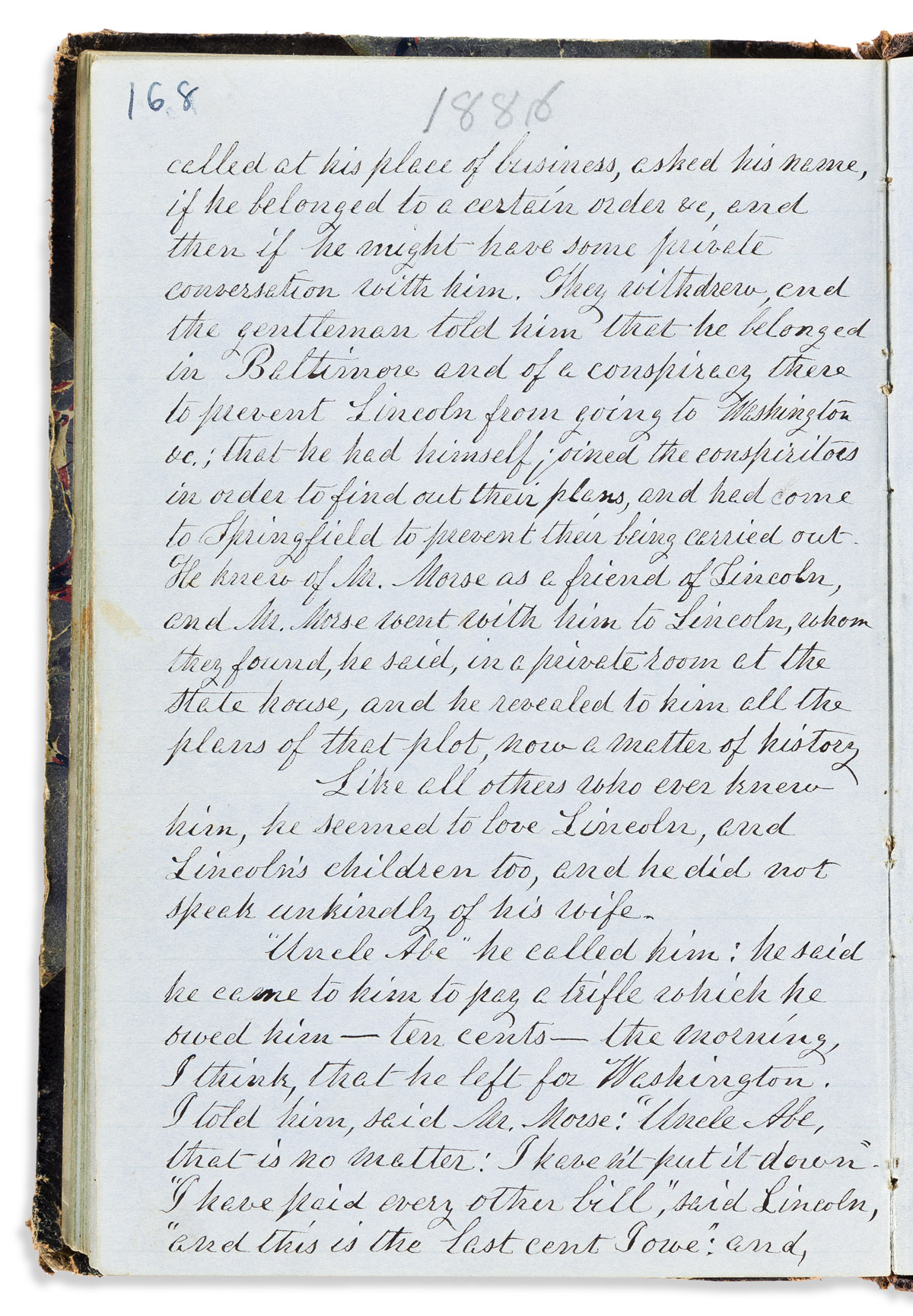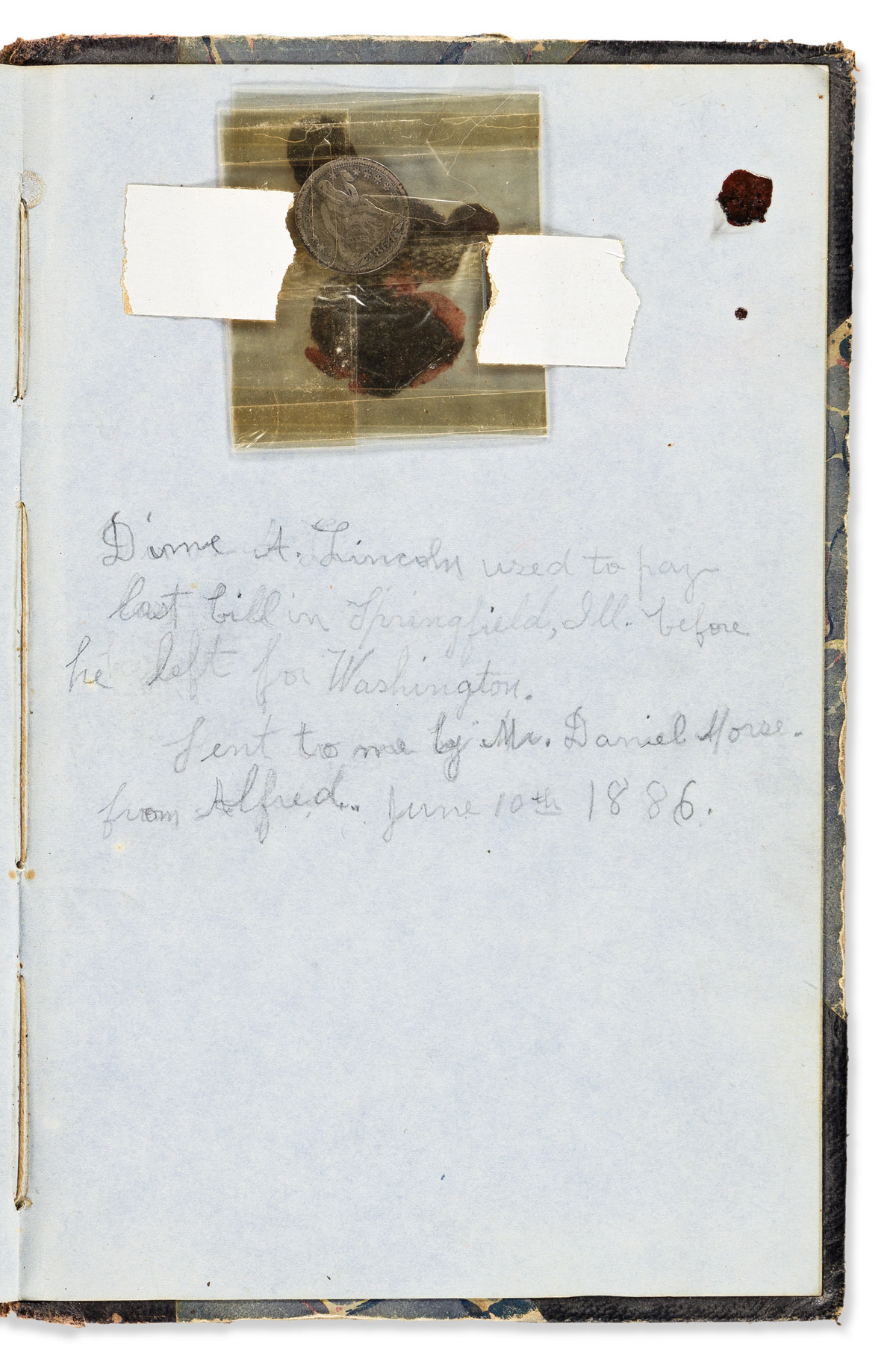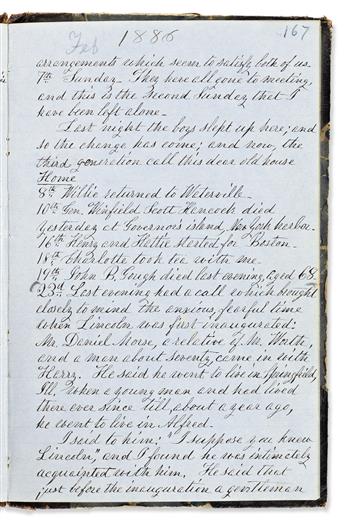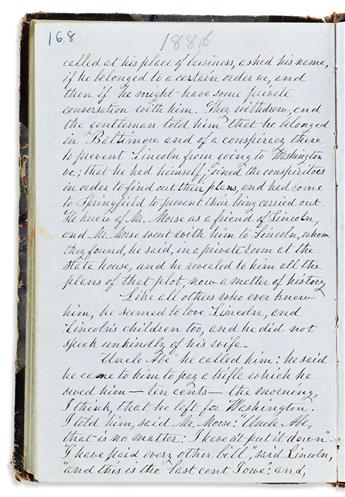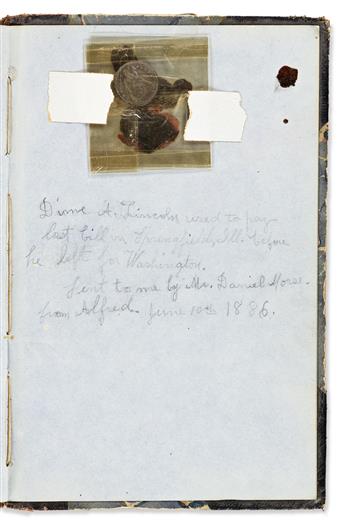Sale 2580 - Lot 154
Price Realized: $ 1,900
Price Realized: $ 2,470
?Final Price Realized includes Buyer’s Premium added to Hammer Price
Estimate: $ 1,000 - $ 1,500
WITH A DIME SAID TO COME FROM LINCOLN (ABRAHAM LINCOLN.) Ann Walker Curtis. Diary recording stories about the Boston Tea Party, Lincoln, the Battle of Lexington and more. 172 manuscript pages. 8vo, 1/2 calf over marbled boards, minor wear; minimal wear to contents; dime in cellophane packet taped to rear pastedown, apparently dislodged from its original sealing-wax mount. [Kennebunk, ME and elsewhere], 1867-86
Additional Details
Ann Walker Curtis (1821-1893) was a lifelong resident of the Kennebunk, Maine area. During the period of this diary, she lived with her widowed mother Susan Walker Curtis (1794-1877) and sister Alice. One of Walker's strengths as a diarist was a curiosity about history. When she met someone with an important story to tell, she recorded it with care and apparent accuracy. Our favorite is entered in the diary on 23 February 1886, when she met a Daniel Morse, aged about 70, who had lived moved of his life in Springfield, Ill., where he was "intimately acquainted" with Lincoln, before recently returning to Alfred, ME: "Just before the inauguration a gentleman called at his place of business . . . told him that he belonged in Baltimore and of a conspiracy there to prevent Lincoln from going to Washington &c; that he himself had joined the conspirators in order to find out their plans, and had come to Springfield to prevent their being carried out. . . . Mr. Morse went with him to Lincoln, whom they found . . . in a private room at the state house, and he revealed to him all the plans of that plot, now a matter of history." On the day Lincoln left for Washington in 1861, he visited Morse "to pay him a trifle which he owed him, ten cents. . . . I told him, said Mr. Morse, 'Uncle Abe, that is no matter. I haven't put it down' 'I have paid every other bill,' said Lincoln, 'and this is the last cent I owe,' and, added Mr. Morse, 'I have that dime now.'" Tucked in the back of the diary is an 1854 dime, with a note: "Dime A. Lincoln used to pay last bill in Springfield, Ill. before he left for Washington, sent to me by Mr. Daniel Morse."
Some of these details check out. Daniel Morse (1819-1898) was born in Maine and shows up in Springfield in the 1870 census and 1860-1872 city directories as a butcher; he was buried in Alfred, ME. He is mentioned briefly in the Collected Works of Abraham Lincoln, serving with Lincoln on a Springfield Republican nominating committee in 1859. The "Baltimore Plot" to assassinate Lincoln on his way east was investigated and guarded against by the Pinkerton Detective Agency. We can't find any record of Pinkerton sending an agent to Springfield to inform Lincoln, so this is either new information or spurious information. The dime--it certainly sounds plausible, although there is no way to prove the dime taped in the back of this volume is the same one given by Lincoln to Morse.
On 20 January 1871, Curtis recorded a neighbor's family story about the Battle of Lexington: "Took tea at Jos. Dane's. Old Mrs. Dane was there, and we talked of the old times. She said her grandfather Clark was the minister of Lexington, and his parsonage close to the battle ground. During the battle her grandmother took her little children and hid with them in the woods behind the parsonage. The house was ransacked by the 'regulars' and all eatables taken, but not injured except where a cannon ball had broken in and lodged among the timbers. John Hancock was a relative of Mrs. D.'s grandmother and spent the evening there the night before the battle." This story stands up under review. The Rev. Jonas Clarke (1730-1805) of Lexington was indeed married to a cousin of John Hancock, who stayed at his home around the time of the battle. Rev. Clark did have a granddaughter, Mary Clark Dane (1790-1872) of Kennebunk, with a son named Joseph Dane (1823-1884).
Perhaps even more impressive, she records some oral history on the Boston Tea Party on 14 June 1879. Her Uncle Andrew recounted knowing as a youth an old man named Jotham Mitchell: "The old man was a Tory, and told of being in Boston when the tea was thrown overboard, and with others taking a skiff and trying to save some, and the stout tax-resisters preventing and almost drowning them for attempting to do so. The son, ashamed, would try to hush his father when he got on that story, but it was all in vain. In his eyes, it was too bad to lose so much tea." Jotham Mitchell (1746-1840) was born and died in Kennebunk; Andrew Walker repeated this story with slight variation in a letter published in the 1892 Proceedings of the Bostonian Society, page 29. In short, we can establish that our diarist was a reliable narrator.
Historical anecdotes aside, this diary is still an interesting slice of local history. Curtis was well connected in her community. Early in the diary, she records the final meeting of a local society to aid freed slaves: "The Freedmen's Meeting at Mr. E.E. Bourne's. Only 9 were there, and we concluded it would now be best to close our meetings, which as Soldiers and Freedmens' meetings we have kept up for seven years. We packed a bbl with articles made and unmade, and shall expend the little money we have on hand in useful articles and add to them" (19 May 1868). An amateur artist, she meets several times with the noted artist Hannah Brown Skeele (1829-1901) (see 24-25 July 1870). A long account of a White Mountains excursion appears on 20 January 1871, and on 6 July 1876 she offers a long account of the town's most senior residents.
Some of these details check out. Daniel Morse (1819-1898) was born in Maine and shows up in Springfield in the 1870 census and 1860-1872 city directories as a butcher; he was buried in Alfred, ME. He is mentioned briefly in the Collected Works of Abraham Lincoln, serving with Lincoln on a Springfield Republican nominating committee in 1859. The "Baltimore Plot" to assassinate Lincoln on his way east was investigated and guarded against by the Pinkerton Detective Agency. We can't find any record of Pinkerton sending an agent to Springfield to inform Lincoln, so this is either new information or spurious information. The dime--it certainly sounds plausible, although there is no way to prove the dime taped in the back of this volume is the same one given by Lincoln to Morse.
On 20 January 1871, Curtis recorded a neighbor's family story about the Battle of Lexington: "Took tea at Jos. Dane's. Old Mrs. Dane was there, and we talked of the old times. She said her grandfather Clark was the minister of Lexington, and his parsonage close to the battle ground. During the battle her grandmother took her little children and hid with them in the woods behind the parsonage. The house was ransacked by the 'regulars' and all eatables taken, but not injured except where a cannon ball had broken in and lodged among the timbers. John Hancock was a relative of Mrs. D.'s grandmother and spent the evening there the night before the battle." This story stands up under review. The Rev. Jonas Clarke (1730-1805) of Lexington was indeed married to a cousin of John Hancock, who stayed at his home around the time of the battle. Rev. Clark did have a granddaughter, Mary Clark Dane (1790-1872) of Kennebunk, with a son named Joseph Dane (1823-1884).
Perhaps even more impressive, she records some oral history on the Boston Tea Party on 14 June 1879. Her Uncle Andrew recounted knowing as a youth an old man named Jotham Mitchell: "The old man was a Tory, and told of being in Boston when the tea was thrown overboard, and with others taking a skiff and trying to save some, and the stout tax-resisters preventing and almost drowning them for attempting to do so. The son, ashamed, would try to hush his father when he got on that story, but it was all in vain. In his eyes, it was too bad to lose so much tea." Jotham Mitchell (1746-1840) was born and died in Kennebunk; Andrew Walker repeated this story with slight variation in a letter published in the 1892 Proceedings of the Bostonian Society, page 29. In short, we can establish that our diarist was a reliable narrator.
Historical anecdotes aside, this diary is still an interesting slice of local history. Curtis was well connected in her community. Early in the diary, she records the final meeting of a local society to aid freed slaves: "The Freedmen's Meeting at Mr. E.E. Bourne's. Only 9 were there, and we concluded it would now be best to close our meetings, which as Soldiers and Freedmens' meetings we have kept up for seven years. We packed a bbl with articles made and unmade, and shall expend the little money we have on hand in useful articles and add to them" (19 May 1868). An amateur artist, she meets several times with the noted artist Hannah Brown Skeele (1829-1901) (see 24-25 July 1870). A long account of a White Mountains excursion appears on 20 January 1871, and on 6 July 1876 she offers a long account of the town's most senior residents.
Exhibition Hours
Exhibition Hours
Aliquam vulputate ornare congue. Vestibulum maximus, libero in placerat faucibus, risus nisl molestie massa, ut maximus metus lectus vel lorem.



